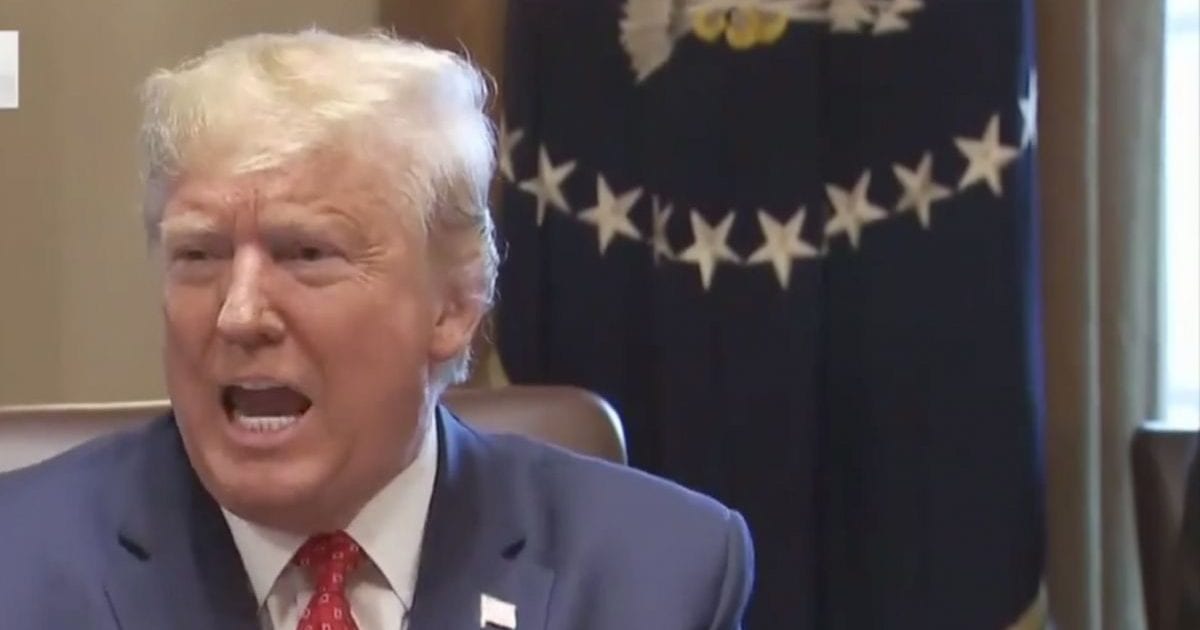Delay, delay, delay.
While both the House and Senate have taken extended recesses, their chambers are still technically in session despite the COVID-19 pandemic.
Various political observers have criticized Democrats of politicizing the novel coronavirus to either bash President Trump or to slow down his agenda.
In this case, congress has not installed the president’s nominees in the federal government’s various vaccancies.
Due to vacant positions, the administration is limited in its ability to respond to COVID-19, though the president has made strong, decisive decisions nonetheless.
But Congress refuses to fill those positions.
Now, President Trump is threatening to invoke a never-used Constitutional authority to adjourn Congress.
This would give Trump the legal power to temporarily fill these positions himself so that his adminsitration can better handle the crisis.
More details on the president’s potential invoking of the never-used Constitutional authority below:
Throughout the entire COVID-19 pandemic, Democrats have appeared to undermine the president's response to the crisis.
Now, some even accuse them of dragging their feet to install Trump's nominations to vacant positions, even though Congress is technically in session.
If these positions remain unfilled, the administration will be handicapped in its ability to best serve and protect the American people.
The New York Times has more details on Trump's threat to adjourn Congress:
President Trump, furious over government vacancies he said were hindering his administration’s coronavirus response, threatened on Wednesday to invoke a never-before-used presidential power to adjourn Congress so he could fill the positions temporarily himself.
The top Senate Republican, Senator Mitch McConnell, quickly let it be known that would not happen.
Days after insisting he had “total” authority to supersede governors’ decisions about whether to reopen their states, Mr. Trump floated the unprecedented step during a White House news conference as he lashed out at Democrats for opposing his nominees. He demanded that Republican leaders immediately call the Senate back into session to confirm them, or take a recess for an extended period of time so he could install stopgap appointees without a vote, a practice known as a recess appointment.
The House and Senate have both taken extended recesses amid the pandemic, convening at least every few days for so-called pro forma sessions — brief meetings that last mere minutes and require the presence of only one lawmaker — to keep their chambers technically in session even though they are not doing business.
The maneuver is routine in the Senate to prevent presidents from making recess appointments, which they can do if the Senate is in recess for 10 days or more.
“The current practice of leaving town while conducting phony pro forma sessions is a dereliction of duty the American people can’t afford during this crisis,” Mr. Trump said on Wednesday. “They have been warned.”
Some Democrats have accused President Trump of a power grab, but the reality is that the Constitution permits the president these powers.
It jst so happens that no president has had to use them yet.
The president's supporters argue that no other president has had this level of resistance from the opposing party.
There are currently 129 nominees who are "stuck" in the pipelines.
It is being reported that Trump and Senate Majority Leader Mitch McConnell have spoken on the issue.
McConnell has publicly stated that he doesn't believe the president will have to use the authority, because McConnell is working to get the nominees critical to the COVID-19 response approved right away.
CNN has more details on the fate of the nominees:
Trump said there were 129 nominees "stuck in the Senate because of partisan obstruction."
Trump's argument seemed to be that many of these vacancies needed to be filled to assist with the coronavirus response, including the director of national intelligence, two members of the Federal Reserve Board of Governors, an assistant secretary of the Treasury Department and an undersecretary of agriculture.
The President argued that since the Senate has left until May 4, he must use his constitutional authority to adjourn it.
"The Constitution provides a mechanism for the President to fill positions in such circumstances. The recess appointment, it's called.
The Senate's practice of gaveling into so-called pro-forma sessions, where no one is even there, has prevented me from using the constitutional authority we're given," he said, calling on the Senate to adjourn itself.
The decision to stay away from Washington until May 4 was made, and announced, by Senate Majority Leader Mitch McConnell, a Kentucky Republican and close Trump ally.
A McConnell spokesman said Trump and McConnell spoke about the issue on Wednesday: "The Leader pledged to find ways to confirm nominees considered mission-critical to the Covid-19 pandemic, but under Senate rules that will take consent from Leader (Chuck) Schumer."
That last point is an important one. McConnell, who is careful with his words, appears to be saying any solution to the confirmation issue will require Democratic consent.
The Constitution allows a president to fill temporary appointments during a recess, without congressional approval.
Throughout his presidency, Democrats have accused President Trump of behaving like an "authoritarian dictator."
However, Trump has been mindful of the Constitution and has only appointed officials and justices with a great respect for the law of the land.
During the COVID-19 pandemic, President Trump has been mindful of everyone's liberties and constitutional rights, whereas many Democratic governors and leaders have appeared to have exceeded their authority.
This story is still developing.



Join the conversation!
Please share your thoughts about this article below. We value your opinions, and would love to see you add to the discussion!